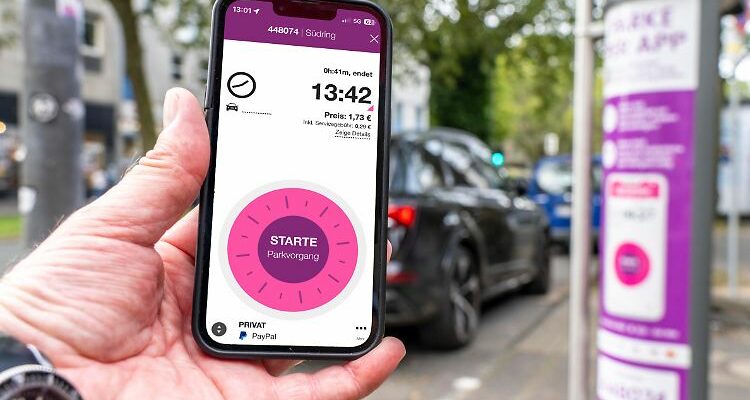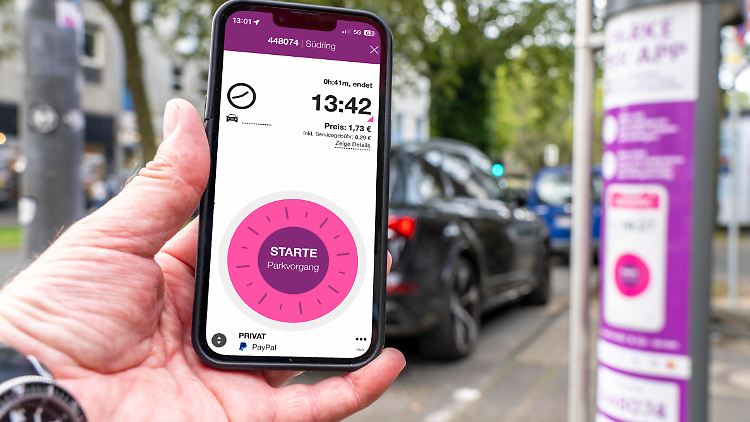Nico Schlegel from Easypark
“We want to completely digitalize the parking space”
December 15, 2023, 5:35 p.m
Listen to article
This audio version was artificially generated. More info | Send feedback
The Easypark Group is conquering Europe’s parking spaces with its app. Germany boss Nico Schlegel speaks in the podcast “Zero Hour” about digital parking fees, an algorithm for free parking spaces – and the question of what cities get out of it.
How much does parking at Easypark actually cost? The website states that the fee ranges from 0 to 15 percent.
Nico Schlegel: Basically it is 15 percent of the parking fees. But there are cities that pay the fee themselves and then the customer pays nothing. In most cases, however, you park and pay us 15 percent of the parking fees.
Do you have to negotiate with cities and municipalities individually about where they will be involved? Isn’t that very complicated?
Yes, that’s right. It requires a lot of resources. We therefore have a sales department that speaks to the cities. We are also a member of an association of cell phone parkers that conducts collective discussions with cities. We prefer this open model. If the city would rather have an exclusive contract, then we will conclude one. In the best case, all cell phone parking providers can participate and the customer can choose which app they like best.
The field of cell phone parking apps has thinned out. In 2022, you yourself took over ParkNow, the joint provider of Daimler and BMW at the time. How was it integrated?
It was a global takeover. We therefore first tried to create the technical requirements in Central Europe. So we have expanded our technology. And now we have to implement this in America. But the development is very positive and we are satisfied with the acquisition.
How many parking transactions in Germany already take place via cell phone? How big is this market?
First of all, digital payment was a bit late in Germany overall. The Scandinavians were much faster. The change actually came in the last three years, also in the wake of Corona. There was an enormous dynamic, including when it came to cell phone parking. Cities’ interest has increased; we now have around 850 cities in Germany that offer this. But the number of users is also increasing. There are cities in which, on average, more than one in three parking transactions is done digitally. Things looked completely different three years ago.
Isn’t cell phone parking a typical case of consolidation? It is rather difficult to imagine that several providers will coexist in the long term.
We firmly believe that there will always be new providers. Maybe some disappear, but new ones keep appearing. In most countries, competition is actually increasing.
Easypark also uses its technology to guide drivers to free parking spaces. How does this work?
The first step is that the parking space is completely digitalized. So you have to know exactly where there are which parking spaces and in what size. We have vehicles equipped with lasers that can detect this parking space. In addition, it must be recorded when you can even park in this parking lot.
So you send some kind of Google car around for parking spaces?
Yes, exactly. We did that in some cities in Germany. You can use different fleets that collect such data. It also records where there are free parking spaces. We bring this data together in anonymous form and use it to build an algorithm. It is important to be able to assess what is likely to happen to a parking space that is now free. What will it look like in five minutes?
So you can’t guarantee a free parking space?
No, but we can make a prediction with a high degree of probability.
Your offer makes car traffic in cities easier and thus makes cars more attractive again. That doesn’t make cities more livable, but rather goes in the other direction.
That’s why we want to expand our service. A third of air pollution comes from traffic looking for parking. So if we help drivers find parking spaces more quickly, then we’re also helping cities try to make the air cleaner. We also provide cities with information about where parking spaces can be sensibly removed or repurposed.
But that’s not in the spirit of your business model.
It looks like this at first glance. But in fact, many cities are expanding parking space management. At the moment there are still many parking spaces where you don’t have to pay. There is now an influx of paid parking spaces. So we don’t see any problem for us in the next few years.
Listen in the new episode of “Zero Hour“
How Easypark works in private garages
Why fewer parking spaces could be good for business
What role charging stations for electric cars play in the concept
You can find all episodes directly here RTL+, Apple or Spotify or via Google.

